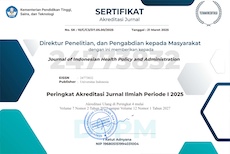Abstract
Schoolchildren are assets for the development of the nation. Therefore, healthy meals at schools are very important, because for them, it covers about 25-36% of the daily energy requirements. Unhealthy eating habits or consumption of nutrition deficient meals may cause stunting, cardiovascular diseases, cancer, diabetes, and osteoporosis. In the short term it may also cause dental caries, anemia, overweight children and obesity. Around 40-44% of meals at schools do not satisfy the food safety requirements. To increase the quality of the meals at the schools, the community should be empowered to perform independent monitoring of school meals. This is inscribed in the national action policy for safe, good-quality, and nutritious meals for schoolchildren. The aim of this research was to assess the effectiveness of the implementation of the national action policy for the snacks of schoolchildren and the factors that influences it. This was a qualitative research. The data was gathered from in-depth interviews and documentary studies and then analyzed using the policy implementation analysis of Mazmanian and Sabatier. From this research we discovered that the policy did not perform effectively in Batam City. There were no Procedure Standard Norms NSPK on the roles, tasks, and responsibilities of the implementers, there was no implementation structure, and no support from the Government and the Parliament of Batam City for the monitoring.
Bahasa Abstract
Anak usia sekolah yang sehat merupakan asset pembangunan bangsa. Keberadaan makanan di sekolah sangat penting , karena akan memenuhi 25-36% kebutuhan energi harian anak. Kebiasaan makan yang tidak sehat (kurang gizi) dapat menyebabkan stunting (perlambatan pertumbuhan anak); penyakit kardiovaskuler, kanker, diabetes dan osteoporosis, sementara untuk jangka pendek dapat menyebabkan dental caries, anemia, overwight dan obesitas. Sekitar 40-44% jajanan anak sekolah secara nasional tidak memenuhi syarat keamanan pangan. Kebijakan Aksi Nasional menuju pangan jajanan anak sekolah (PJAS) yang aman bermutu dan bergizi, merupakan salah satu upaya meningkatkan mutu pangan jajanan anak sekolah dengan cara memberdayakan komunitas sekolah secara mandiri mengawasi pangan jajanan di lingkungannya. Penelitian ini bertujuan untuk melihat faktor faktor yang mempengaruhi efektivitas dari implementasi kebijakan Aksi Nasional PJAS. Penelitian dilakukan dengan metode kualitatif. Pengumpulan data dilakukan melalui wawancara mendalam dan studi dokumen dengan menggunakan analisa implementasi kebijakan dari Mazmanian dan Sabatier. Hasil dari penelitian memperlihatkan bahwa implementasi kebijakan Aksi Nasional PJAS di kota Batam tidak terlaksana dengan efektif, tidak ada NSPK terkait peran, tugas dan tanggung jawab kelompok pelaksana, tidak ada strukturisasi pelaksanaan kebijakan tersebut, dan tidak ada dukungan langsung dari Pemerintah dan DPRD untuk melakukan pengawasan.
Recommended Citation
Rafqi, Ahmad and Adisasmito, Wiku Bakti Bawono
(2017)
"An Analysis of the Factors that Influence the Implementation of the Policy for Monitoring Schoolchildren Meals Monitoring at Batam City,"
Journal of Indonesian Health Policy and Administration: Vol. 2:
No.
1, Article 1.
DOI: 10.7454/ihpa.v2i1.1847
Available at:
https://scholarhub.ui.ac.id/ihpa/vol2/iss1/1




